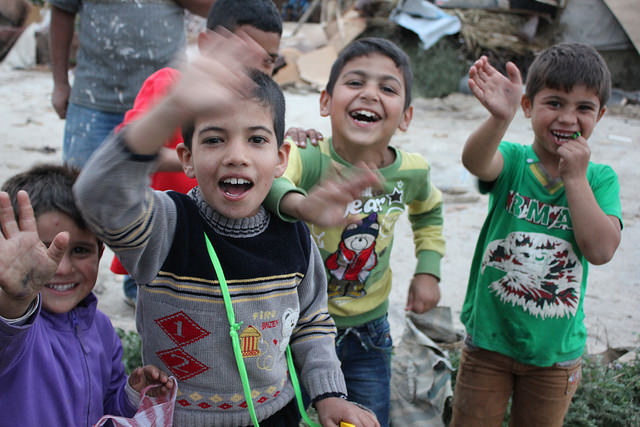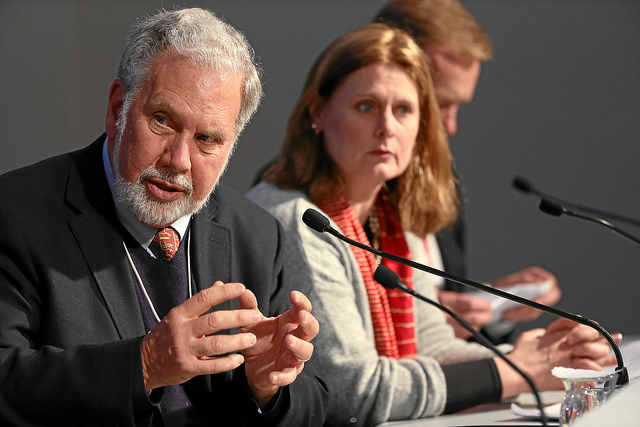BUSINESSES COMMIT $50 MILLION TO GET SYRIAN CHILDREN BACK INTO SCHOOL

Photo by Tyler Zang.
GBC-Education has enlisted more than 50 companies to support the education of Syrian refugee children. Together, these Coalition members and partners are committing more than $50 million through financing and in-kind support, the first set of commitments from the private sector in the lead up to the Syria Donors Conference.
These corporate commitments are critical to the global education development effort, particularly as the private sector continues to evaluate how they can support humanitarian efforts in hopes of inspiring donor governments to take further and appropriate action. Historically, companies have been bound by their corporate social responsibility pledges which limit their contributions to social efforts, or have been otherwise excluded from such conversations. Now, by directly addressing the Syrian refugee crisis, the private sector is simultaneously showcasing their unique position of delivering strategic, innovative solutions to further humanitarian efforts, while reinforcing the business case for investing in education. With the resolute stance to support out-of-school Syrian refugee children, these businesses are setting a precedent for prioritizing and rethinking approaches to protecting education in emergency.
The diversity of the organizations, some of which are personally affected by the crisis, also illustrate how different companies can pivot their programming and resources to improve, innovate and close existing system gaps. For example, EuroMENA Fund via GBC-Education member ITWORX Education is committed to raising private financing and contributing ITWORX’s e-learning technology; member Pearson is leveraging their “Every Child Learning” partnership with Save the Children to deliver learning content and research new solutions; member NRS International is donating temporary learning spaces for refugee education; and member Vitol Foundation is partnering with Bridge International Academies, and McKinsey & Company to develop a low-cost, high-quality, and scalable education model for refugee children.
Other contributions span across a range of institutions and include accelerated learning models for children who have been without schooling and are behind from the Speed School Fund; scholarship financing and mentoring for children pursuing higher education from NGO Jusoor; the curation of free digital learning content into effective curriculum through a rapidly growing online community of thousands of volunteer educators from NGO Rumie; technology supporting digital learning from The Breteau Foundation; and the expertise of institutions like New York University through its Global TIES Programme. Foundations such as Ikea Foundation, Makhzoumi Foundation and Mikati Foundation also pledged support.
GBC-Education Executive Chair Sarah Brown announced these commitments — which include not only financing, but also crucial thought leadership and in-kind support — at a press conference on Thursday during the World Economic Forum taking place in Davos, Switzerland. Norway Minister of Foreign Affairs Borge Brende, UNICEF Executive Director Anthony Lake, and UN Special Envoy for Global Education Gordon Brown joined her in the effort to support the 24 million out-of-school children currently living in conflict zones.
“Our coalition members are not only supporting with money, but bringing their vast expertise, ideas, creativity, and connections to tackle this enormous challenge,” said Sarah Brown. “This is not only about getting children back into the classroom but also making sure that they are safe getting to school and that teachers have access to the right resources to ensure that they are delivering a quality of education. A challenge like this creates a space for business to really show how they can play a huge role, and make a fundamental difference to the lives of some of the most vulnerable children in the world.”
Plans are underway to enroll 1 million Syrian refugee children into a double shift school system in Turkey, Lebanon, and Jordan. GBC-Education has been convening business leaders in the Middle East to support this plan; including organizing a high-level roundtable to discuss solutions for the Syrian crisis in December. The coalition will also continue to expand its network in the Middle East alongside partners like the Young Presidents Association and business networks in the region.
Learn More: Educating the World’s Out of School Children Makes Business Sense
Right now, there are tens of millions of children without access to even a basic primary school-level education, spread across some of the world’s toughest-to-reach regions. In Nigeria, more than 1 million children are unable to attend school due to the threat of the Islamist insurgent group Boko Haram as they attempt to terrorize girls’ education. In the Middle East, 2 million Syrian school-age children have abandoned their homes along with their families in hopes of experiencing a conflict-free life in Lebanon, Jordan, Turkey, Iraq, and Egypt. With the average refugee spending 17 years in exile, many of these children may never return to school.
The imperative is clear: Education should be prioritized, even during emergency situations. For every three years of violence, GDP growth drops at least 2.7 percent. Delivering education, even in crisis and emergency, has the power to not only save lives and prevent violence, rape, sex trafficking, and recruitment into fighting, but also foster inclusion and tolerance, mitigating conflicts in the long-term. Learn more about the business case for supporting education in emergencies.
Learn about the Coalition’s work to overcome barriers to education in 2015.

